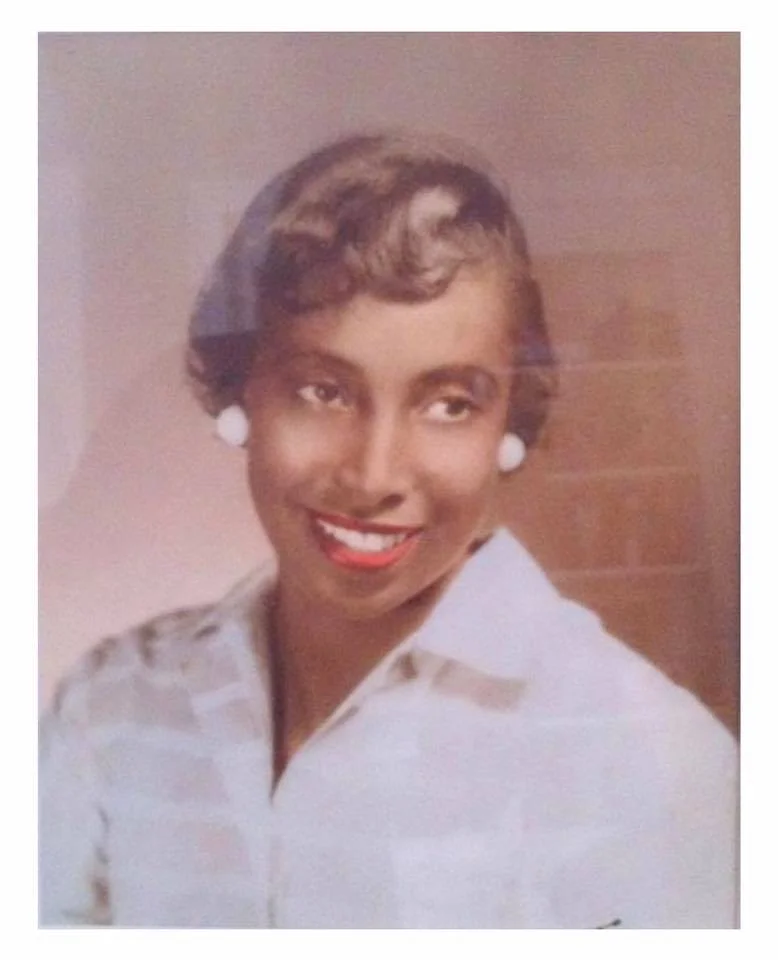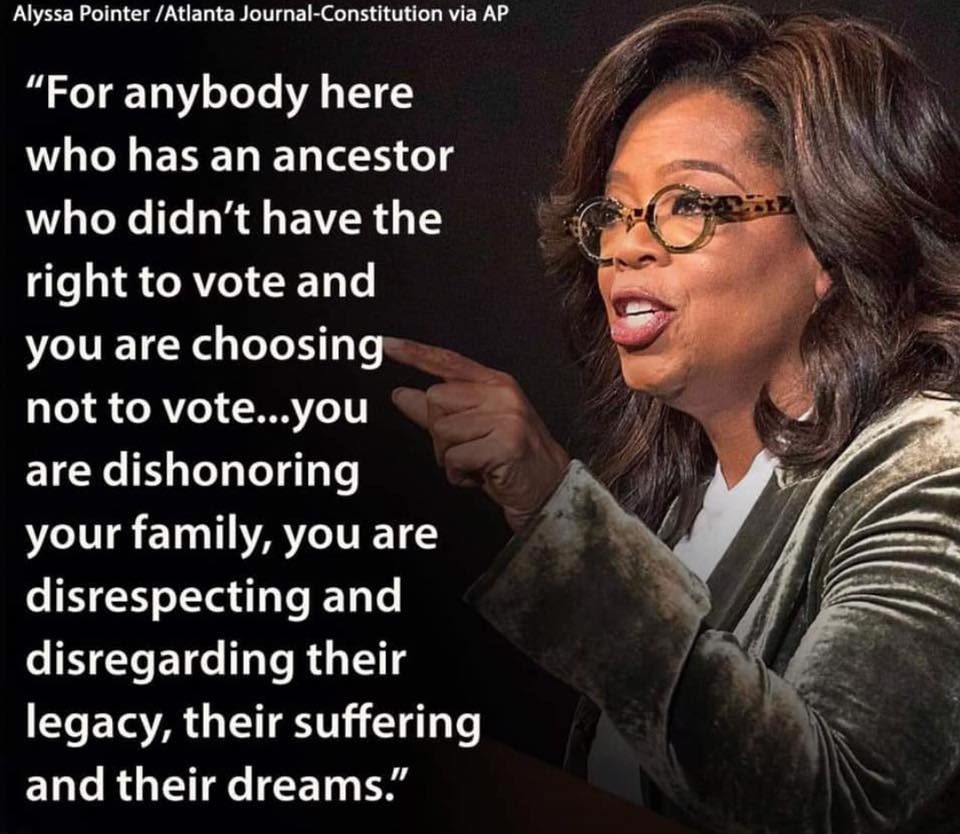From a young age I have always been fascinated with people’s stories and history. My dad once told me that I should have been a news reporter since I asked so many questions growing up. I guess I am just inquisitive by nature. I want to know the whole story, the backstory, history and every little detail. Being a psychology major I also loved how our past and environments shape who we are and the power of our journey.
Recently I have been intrigued by a brave woman who told her story, her truth and how it changed history. She shares the same first name as my beautiful grandmother, Fannie Mae Thompson 😊.
Fannie Lou Hamer was a sharecropper in Mississippi who wanted to learn more about voting and how to exercise her right to vote in the 1960’s. She was challenged at every angle to the point of almost losing her life. She is famous for her quote regarding the oppression that she was facing in those turbulent times: "I am sick and tired of being sick and tired”.
Black voters were met with constant opposition when it came to voting. It is crazy that even in 2018 we are facing some of the same suppression tactics that were used in the past. Fannie Lou was given the opportunity to share her story of voter suppression and the violence she endured at the hands of law enforcement to the credentials committee of the Democratic National Convention in 1964.
The proceedings were to be televised nationally and there was fear that her story would cause then President Lyndon Johnson to lose support in the south. The president decided to interrupt the televised program with an impromptu press conference. More suppressive tactics in play but thankfully they backfired! The news media realized what was happening and decided to replay her story later that night. Her powerful account of her story and her truth shocked the nation and brought light to the horrible violence and atrocities in the South.
Her story was the catalyst that helped to pave the way for the passage of the Voter’s Rights Act in 1965 that lead to a huge increase of black voters voting in Mississippi and the South. Just wow!!! Fannie Lou continued to share her story and ended up running and becoming a state senator in her district and played a huge part in the civil rights movement. Just amazing!
I’m honored that Fannie Lou’s actions impact me today as I am able to vote as a black female in the South.
Thank you, Fannie Lou and all the amazing trailblazers that were not afraid to speak their truth. I want to encourage everyone to reflect on your own amazing journey/story. Share your story and gifts with others when you can - you never know the impact your life can have on others or the world!
I wanted to end this week’s blog post with the transcript of her powerful speech that day. You can read it below and here the audio here >>https://youtu.be/ML3WaEsCB98.
Fannie Lou Hamer’s Speech:
“Mr. Chairman, and to the Credentials Committee, my name is Mrs. Fannie Lou Hamer, and I live at 626 East Lafayette Street, Ruleville, Mississippi, Sunflower County, the home of Sen. James O. Eastland, and Sen. Stennis.
It was the 31st of August in 1962 that 18 of us traveled 26 miles to the county courthouse in Indianola to try to register to become first-class citizens.
We was met in Indianola by policemen, highway patrolmen, and they only allowed two of us in to take the literacy test at the time. After we had taken this test and started back to Ruleville, we was held up by the city police and the state highway patrolmen and carried back to Indianola where the bus driver was charged that day with driving a bus the wrong color.
After we paid the fine among us, we continued on to Ruleville, and Rev. Jeff Sunny carried me four miles in the rural area where I had worked as a timekeeper and sharecropper for 18 years. I was met there by my children, who told me that the plantation owner was angry because I had gone down to try to register.
After they told me, my husband came, and said the plantation owner was raising Cain because I had tried to register. Before he quit talking the plantation owner came and said, "Fannie Lou, do you know -- did Pap tell you what I said?"
And I said, "Yes, sir."
He said, "Well I mean that." He said, "If you don't go down and withdraw your registration, you will have to leave." Said, "Then if you go down and withdraw," said, "you still might have to go because we are not ready for that in Mississippi."
And I addressed him and told him and said, "I didn't try to register for you. I tried to register for myself."
I had to leave that same night.
On the 10th of September 1962, 16 bullets was fired into the home of Mr. and Mrs. Robert Tucker for me. That same night two girls were shot in Ruleville, Mississippi. Also Mr. Joe McDonald's house was shot in.
And June the 9th, 1963, I had attended a voter registration workshop, was returning back to Mississippi. Ten of us was traveling by the Continental Trailway bus. When we got to Winona, Mississippi, which is Montgomery County, four of the people got off to use the washroom, and two of the people -- to use the restaurant -- two of the people wanted to use the washroom.
The four people that had gone in to use the restaurant was ordered out. During this time I was on the bus. But when I looked through the window and saw they had rushed out I got off of the bus to see what had happened. And one of the ladies said, "It was a state highway patrolman and a chief of police ordered us out."
I got back on the bus and one of the persons had used the washroom got back on the bus, too.
As soon as I was seated on the bus, I saw when they began to get the five people in a highway patrolman's car. I stepped off of the bus to see what was happening and somebody screamed from the car that the five workers was in and said, "Get that one there." When I went to get in the car, when the man told me I was under arrest, he kicked me.
I was carried to the county jail and put in the booking room. They left some of the people in the booking room and began to place us in cells. I was placed in a cell with a young woman called Miss Ivesta Simpson. After I was placed in the cell I began to hear sounds of licks and screams, I could hear the sounds of licks and horrible screams. And I could hear somebody say, "Can you say, 'yes, sir,' nigger? Can you say 'yes, sir'?"
And they would say other horrible names.
She would say, "Yes, I can say 'yes, sir.'"
"So, well, say it."
She said, "I don't know you well enough."
They beat her, I don't know how long. And after a while she began to pray, and asked God to have mercy on those people.
And it wasn't too long before three white men came to my cell. One of these men was a state highway patrolman and he asked me where I was from. I told him Ruleville and he said, "We are going to check this."
They left my cell and it wasn't too long before they came back. He said, "You are from Ruleville all right," and he used a curse word. And he said, "We are going to make you wish you was dead."
I was carried out of that cell into another cell where they had two Negro prisoners. The state highway patrolman ordered the first Negro to take the blackjack.
The first Negro prisoner ordered me, by orders from the state highway patrolman, for me to lay down on a bunk bed on my face.
I laid on my face and the first Negro began to beat. I was beat by the first Negro until he was exhausted. I was holding my hands behind me at that time on my left side, because I suffered from polio when I was six years old.
After the first Negro had beat until he was exhausted, the State Highway Patrolman ordered the second Negro to take the blackjack.
The second Negro began to beat and I began to work my feet, and the State Highway Patrolman ordered the first Negro who had beat me to sit on my feet -- to keep me from working my feet. I began to scream and one white man got up and began to beat me in my head and tell me to hush.
One white man -- my dress had worked up high -- he walked over and pulled my dress -- I pulled my dress down and he pulled my dress back up.
I was in jail when Medgar Evers was murdered.
All of this is on account of we want to register, to become first-class citizens. And if the Freedom Democratic Party is not seated now, I question America. Is this America, the land of the free and the home of the brave, where we have to sleep with our telephones off the hooks because our lives be threatened daily, because we want to live as decent human beings, in America?
Thank you.”
By Kara Norman- Empower Her, Inc.
Kara Norman Atlanta Based Women Empowerment Thought Leader and bi-weekly blog contributor.
Kara Norman has been working with Women and Girls for a number of years. Her nonprofit organization Empower Her Inc , have led to many opportunities in the space of making social changes as it deals with women and their many roles in society. You can learn more about Kara Norman and Empower Her Inc. at http://www.empowerherinc.com/







